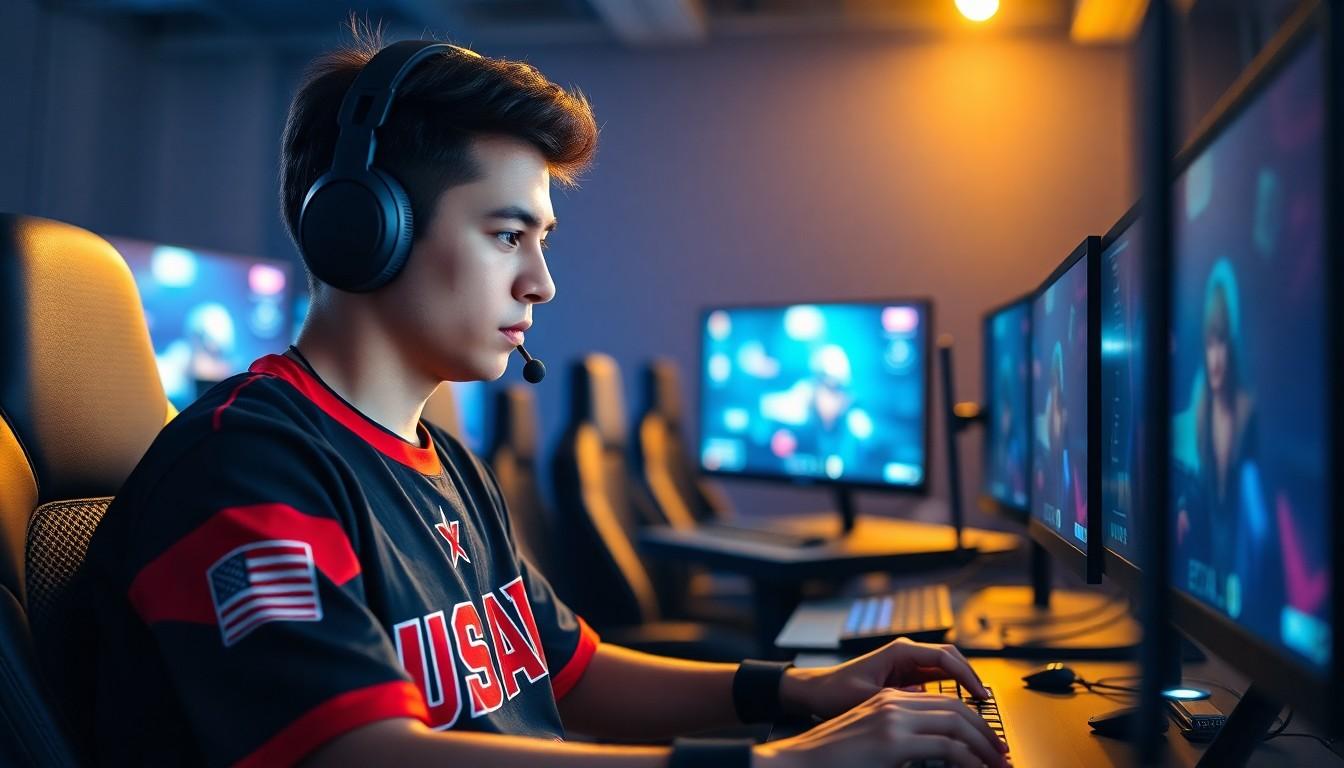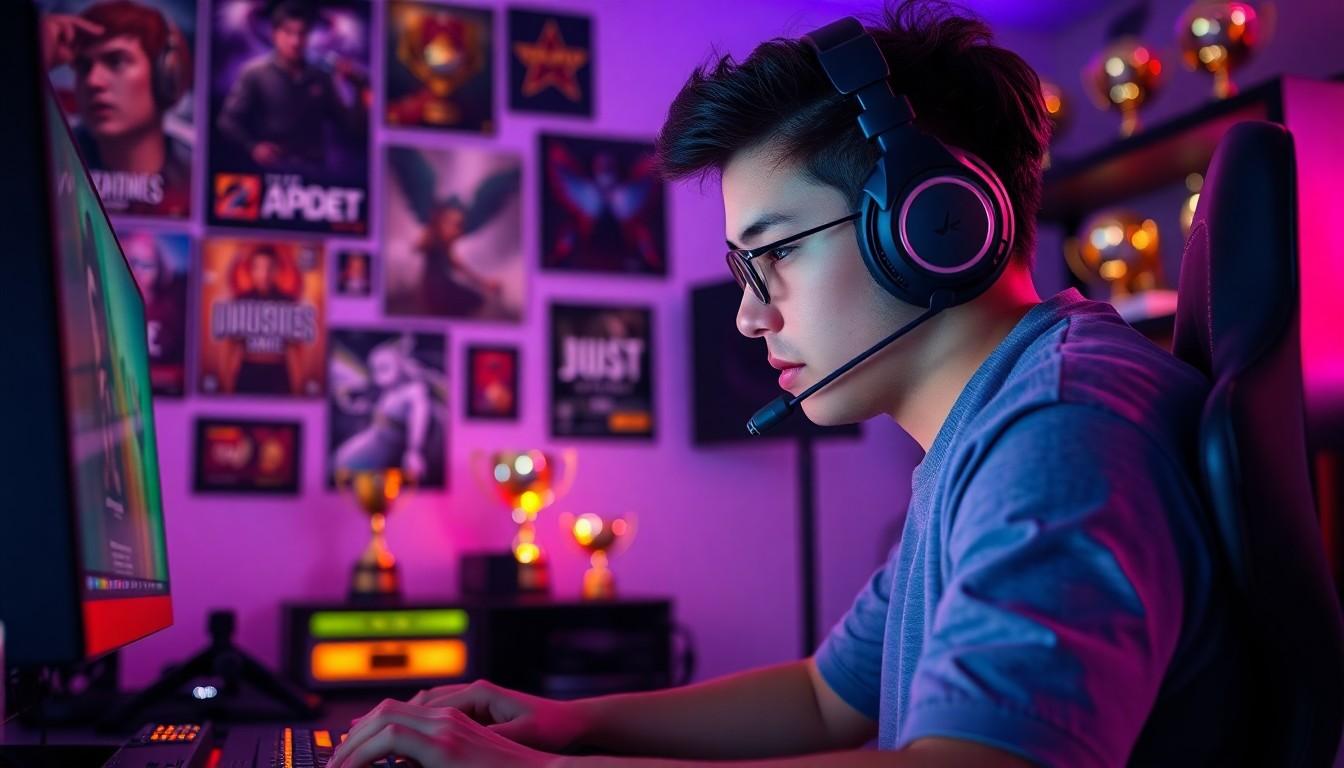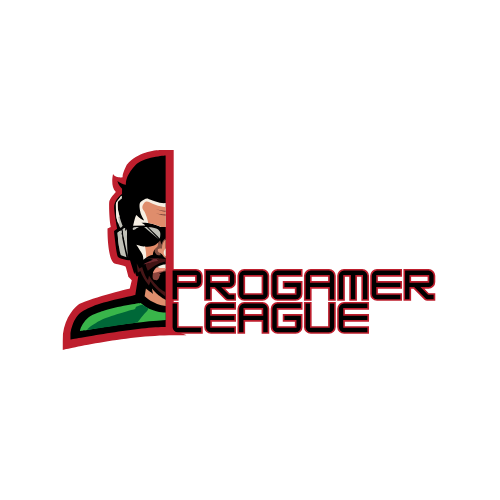
Professional Gamers: How They Dominated the Digital Sports Scene and Changed Gaming Forever
In a world where gaming once lived in basements and arcades, professional gamers have emerged as the rock stars of the digital age. They don’t just play; they conquer virtual realms, raking in cash and fame while many still struggle to finish the tutorial. With lightning-fast reflexes and strategies that would make a chess grandmaster sweat, these players turn pixels into profit, proving that gaming is more than just a hobby—it’s a legitimate career path.
But what does it really take to go from casual player to pro? It’s not just about having the latest gear or a killer gaming chair that promises to enhance performance (though it helps). It’s a blend of skill, dedication, and a sprinkle of luck. Buckle up as we dive into the world of professional gamers, where every match is a new adventure and every victory is a step closer to the ultimate gaming glory.
Overview of Professional Gamers
Professional gamers engage in competitive play across various video game genres. Their journey often begins with a passion for gaming, which evolves into intensive practice and skill development. Success hinges on a mix of talent, strategy, and consistent training.
Many professional gamers dedicate hours daily to practice, refining their reflexes and mastering game mechanics. They frequently participate in tournaments, where competition can range from local events to international championships. Prizes for top performers frequently reach six figures, reflecting the lucrative nature of the gaming industry.
Communities and fanbases play a significant role in their careers. Gamers build a following through streaming platforms like Twitch and YouTube, drawing in fans to enhance their visibility and marketability. Sponsorship deals from gaming brands and related companies provide additional financial support for many professionals.
Organizations also contribute to the professional gaming landscape. Numerous teams exist, offering structure and resources to players. These organizations often invest in player development, ensuring participants maintain peak performance and secure competitive advantages.
Technology continues to shift the dynamics of professional gaming. High-resolution monitors and gaming peripherals have become essential tools, elevating the gaming experience. Cutting-edge software also supports game analysis, helping players improve strategies and gameplay.
Overall, professional gamers represent a significant facet of modern entertainment. As they redefine the concept of sports, their influence continues to grow, transforming not just the gaming community but also mainstream culture.
The Rise of Professional Gamers

Professional gamers have gained recognition and respect in recent years, transforming gaming into a viable career path. Their ascent exemplifies the changing landscape of entertainment where video game competitions captivate audiences worldwide.
Historical Context
The evolution of professional gaming traces back to the 1970s and 1980s when arcade competitions introduced organized play. With titles like Space Invaders and Pac-Man, players began gathering for tournaments, laying the groundwork for future events. The industry saw significant growth in the late 1990s as the release of games like StarCraft sparked competitive leagues. These early tournaments highlighted the potential for large audiences and financial incentives, drawing sponsors and media attention. By the 2000s, professional gaming established itself as an organized entity with the rise of tournaments like Major League Gaming, cementing a foundation built on skill and competition.
Current Trends in Esports
Esports dynamic continues to evolve as it attracts global audiences. Streaming platforms such as Twitch and YouTube facilitate real-time engagement with fans, boosting gamer visibility. A significant trend showcases the rise of diverse game genres, with battle royale games like Fortnite and competitive multiplayer titles like League of Legends dominating the scene. Additionally, sponsorships from major brands provide financial support, enabling gamers to compete professionally. Viewership statistics reflect this change, with millions tuning in for major events, showcasing the transformation of gaming into a mainstream spectacle. Consequently, professional gaming thrives as a lucrative and influential industry, shaping entertainment’s future.
Skills and Training of Professional Gamers
Professional gamers require a unique blend of skills and rigorous training to excel in their field. Mastering their craft involves dedication, focus, and strategic practice.
Dedication and Practice Routines
Players often engage in extensive practice routines that span several hours daily. Structured schedules typically encompass gameplay, strategy analysis, and skill honing. Techniques vary, with some gamers employing drills to enhance reflexes, while others focus on team coordination and communication. Metrics, such as accuracy and reaction times, drive improvement, allowing competitors to identify weaknesses and track progress. Maintaining motivation is crucial; establishing goals fosters a competitive mindset and consistency in practice.
Mental and Physical Health Considerations
Balancing competitive gaming with mental and physical health is essential. Gamers face mental fatigue and stress due to high-stakes environments and pressure. Incorporating breaks into practice sessions can mitigate burnout and improve focus. Physical fitness also plays a role; regular exercise aids concentration and stamina during long gaming sessions. Healthy diets support cognitive function and energy levels. Mental health support, including mindfulness techniques and therapy, can help manage stress, keeping gamers at their best in tournaments.
The Impact of Professional Gamers on Gaming Culture
Professional gamers significantly shape gaming culture, creating communities and influencing trends. Their impact resonates far beyond the screen, fostering connections among gamers worldwide.
Community Engagement and Influence
Community engagement thrives around professional gamers. They cultivate passionate followers through social media platforms and gaming events. Gamers share experiences, strategies, and insights, creating a vibrant exchange of ideas. Local and online tournaments often draw fans, emphasizing the support for both players and the games they love. In turn, this dynamic interaction builds a sense of belonging within gaming communities. Enthusiasts unite, celebrating achievements and discussing favorite titles, which strengthens the overall gaming culture.
The Role of Streaming and Content Creation
Streaming platforms revolutionize how professional gamers interact with fans. These platforms offer opportunities for gamers to showcase skills live, drawing millions of viewers. Content creation extends their reach, as tutorials and highlight reels attract audiences. Gamers build personal brands, turning gaming into lucrative careers through merchandise sales and sponsorship deals. Audiences find entertainment and learning in these streams, deepening their connection with the gaming experience. This continuous engagement shapes viewer expectations and influences game development, highlighting the essential role streaming plays in modern gaming culture.
Conclusion
The journey of professional gamers illustrates a remarkable evolution within the gaming industry. Their dedication and skill not only elevate their status but also reshape cultural perceptions of gaming. As they continue to push boundaries and engage with their communities, professional gamers are setting new standards for what it means to compete at the highest level.
The future of esports looks bright with ongoing advancements in technology and increasing audience engagement. As more players enter the scene and the industry expands, the impact of professional gamers will only grow. They’re not just players; they’re pioneers influencing the next generation of gamers and redefining entertainment in the digital age.
